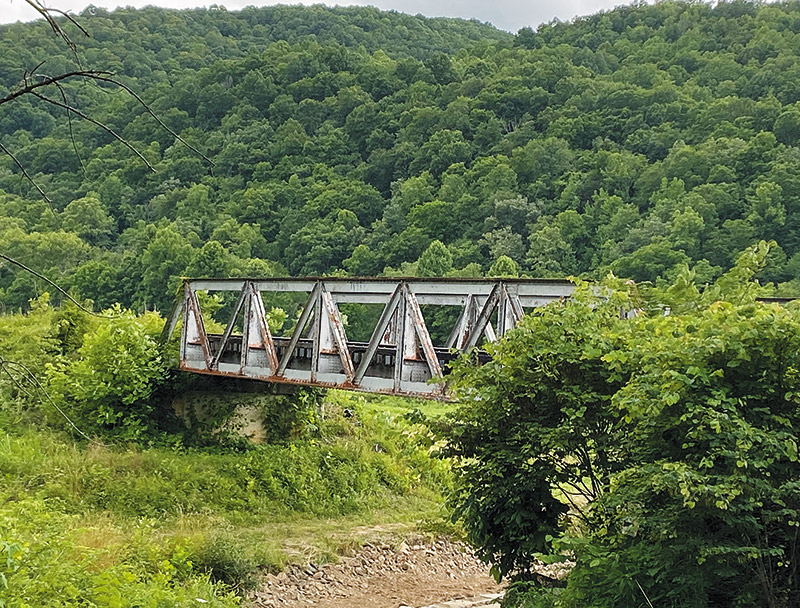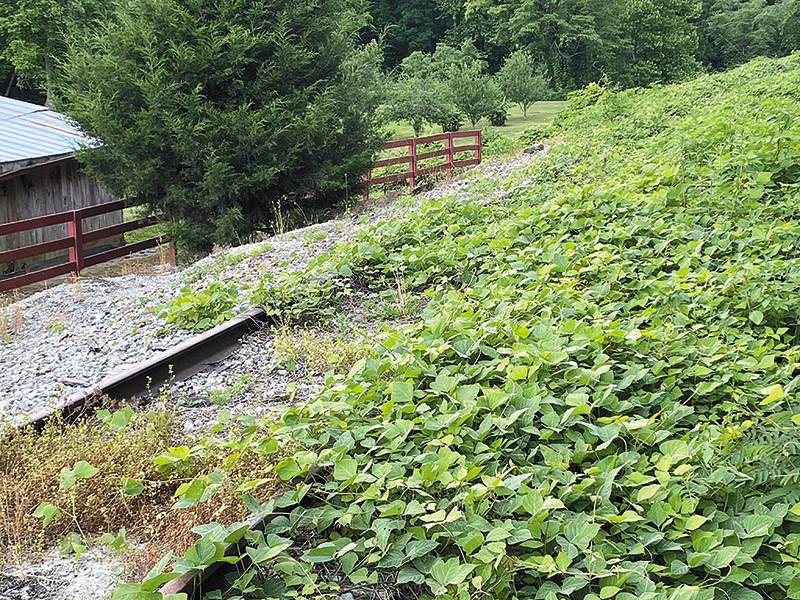Agency denies bid to stop rail line’s demise
An historic railroad line along the New River in Anderson, Campbell and Scott counties now has been cleared for permanent abandonment as a result of a ruling last Friday (June 26) by the U.S. Surface Transportation Board.
The board rejected a June 23 bid from an Oklahoma-based railroad company to buy the 42-mile rail line that runs from Oneida in Scott County to Devonia in remote Anderson County. No trains have run on the line – the former Tennessee Railroad – since a deep coal mine stopped production in the Fork Mountain area near Devonia in early 2013.
Pending the outcome of an appeal, which was filed Monday afternoon, the STB’s Friday ruling would immediately allow the line’s current owner, the R.J. Corman Railroad Co., to abandon the route and begin pulling up track and other components of the line.
In its decision, the STB said that the proposed buyer of the line, the Arkansas-Oklahoma Railroad Co., had not “sufficiently demonstrated ‘a continued need for rail service’ on the line,’” adding that the line had “no active shippers.”
According to the STB, for the proposed buyer to win a bid for a rail line that is about to be abandoned under its rules, “an offeror must demonstrate through evidence that there is a continued need for rail service on the line.”
Statements supporting the bid by the Arkansas-Oklahoma Railroad Co. of Wilburton, Oklahoma, were filed by Anderson, Scott and Campbell county governments, the North East Tennessee Rail Authority, and others, including two proposed shippers on the line – National Coal Co. of Knoxville and Evergreen Packaging Co. of Pioneer. Both said they hoped eventually to ship coal and timber, respectively, on the line at some point.
The STB said that while the purchase offer (Offer of Financial Assistance, or OFA) by Arkansas-Oklahoma Railroad and the statements submitted by the other parties showed that there was “community support for preserving the Line,” but that they provided “no specific detail demonstrating any commercial need for rail service.”
The board also dismissed the use of the line by a planned passenger rail excursion company, saying that provisions allowing a forced sale under an OFA require future use of such a line for freight shipments, and that passenger service does not qualify.
Anderson County Mayor Terry Frank, who also is chairman of the North East Tennessee Rail Authority, has been leading efforts to save the scenic stretch of railroad along the New River for more than a year. The line dates to 1889.
Frank said Monday that she’s still looking at options to stop the abandonment and imminent destruction of the line, which she said could be crucial to the economic future of the three-county area.
“I was very disheartened,” she said of Friday’s decision by the STB to allow the abandonment. “A lot of state money went into that rail line. I look at this as a great economic opportunity for our region, and I haven’t given up the fight yet.”
In its appeal of the STB order, which Arkansas-Oklahoma Railroad Co. filed on Monday, the company said the federal agency erred in its decision by ruling that “AOK failed to demonstrate thorough evidence that there is a continued need for rail service on the line.”
Instead, the railroad company said, the STB’s own rules allow for using the OFA process to stop an abandonment if there is evidence of “community support for preserving the line.”
The appeal notes, “The Director’s decision acknowledged that ‘AOK has provided evidence of general community support for its OFA,’ and that submissions by Anderson County and Tennessee Mining Association indicate ‘community support for preserving the Line.’”
“That evidence unquestionably complies with the requirement of the applicable regulation, i.e., ‘evidence of community support for continued rail service.’ … On the basis of that evidence, the Director should have found that there is a continued need for rail service on the line,” the appeal said.
Further, Arkansas-Oklahoma Railroad argues: “The Board has an excellent record of preserving lines for continued rail service. The Director’s decision goes in an opposite direction. The Board should grant this Appeal to prevent manifest injustice.”
Arkansas-Oklahoma Railroad bid nearly $425,000 for the rail line, which was only about 10 percent of what the Nicholasville, Kentucky-based R.J. Corman asked in its last offer to sell the line. But the value of the line is diminished immensely by the depressed property values in the area, particularly in Scott County, Frank said.
R.J. Corman officially filed the abandonment petition with the STB in March, and has been fighting to keep Arkansas-Oklahoma Railroad from taking it over since early in the process.
Frank said she still does not know why R.J. Corman seems to be so vehemently opposed to having another railroad take over and reopen the line, which connects to the Cincinnati Southern Railroad line in Oneida, operated by Norfolk Southern Corp.
“That’s a question I’m going to try to find an answer to,” the mayor said Monday.
The STB ruling does allow a trail consortium to continue working with R.J. Corman on an agreement to turn the line into a hike-and-bike trail, which would at least preserve the right of way for future use as a rail line, if necessary. But the steel rail and ties would be removed, and any reinstallation of those could be cost-prohibitive, Frank said.
The Tennessee Mining Association said it had “grave concerns regarding the potential abandonment” of the line.
“Abandonment of this line would jeopardize any future utilization of coal reserves in this area by Tennessee miners,” the association said in its letter to the STB. “As an organization that supports the critical operation of the mining industry in the state of Tennessee, TMA adamantly opposes this action.”
The association also argued, “Preservation of this rail line will protect future, affordable access by Tennessee mining companies to undeveloped coal reserves in Anderson County, in addition to supporting imminent freight needs. Active mining operations serve to provide critical reserves for electricity and numerous well-paying jobs in this rural area of the state.”
Owned by Norfolk Southern Corp. (formerly The Southern Railway) from 1973 until Knoxville-based National Coal Corp. bought it in 2006 for $2 million, the line was begun in 1889 and extended to its current terminus at a now-abandoned coal preparation plant at Devonia in 1912.
When National Coal was on the verge of bankruptcy in 2010, it sold the line to R.J. Corman for $3 million, and it was used to haul coal out of the Fork Mountain area from a deep mine and a surface mine until those operations shut down in 2013. Since then, the line has not been used, and has fallen into disrepair.
Part of the line from Huntsville in Scott County to Indian Fork in Anderson County did have a short life as a tourist excursion route from 2008 to 2010 when Scotty Phillips, owner of the New River General Store at Devonia, and business partner Jimmy Byrge of Knoxville started the New River Scenic Railway.
They ran the train – consisting of a vintage 1951 Alco RS3 diesel locomotive and two passenger cars – until shortly after R.J. Corman bought the rail line from National Coal and proceeded to terminate the excursion operation’s rights to use the tracks.
The former New River Scenic Railway engine and two rail cars – which Phillips brought here from Arizona -- have sat abandoned on a siding behind the Devonia coal-prep plant along Tennessee Route 116 since 2010, and all three units have been heavily vandalized.
Frank noted earlier that there are still significant coal reserves in the areas of Anderson County that are served by the rail line, controlled by National Coal, a subsidiary of a company owned by West Virginia Gov. Jim Justice.
“Once a rail line is abandoned and the tracks are pulled up, it’s nearly impossible to ever get it back,” Frank said.




